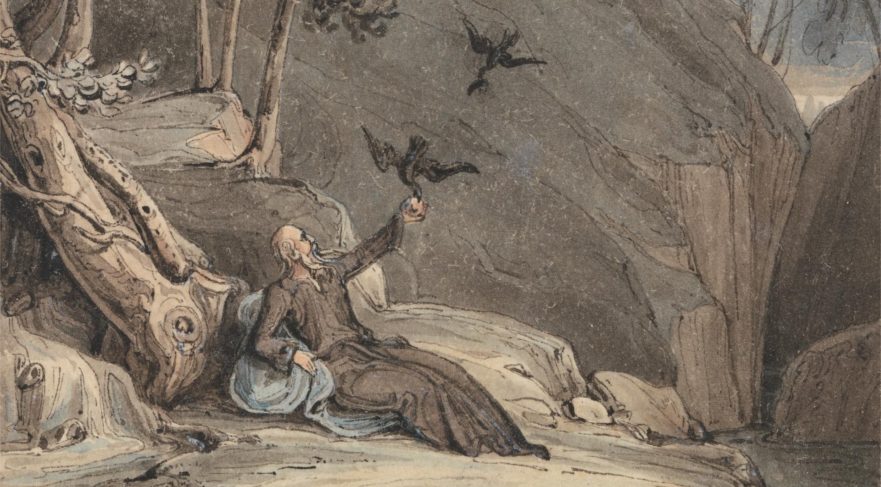Elijah was a man of like nature with ourselves and he prayed fervently that it might not rain, and for three years and six months it did not rain on the earth. Then he prayed again and the heaven gave rain, and the earth brought forth its fruit. (James 5:17-18)[1]
Elijah: An Unlikely Example
Toward the end of his Epistle, James exhorts his readers to pray with faith for the healing of the sick. When we read that “the prayer of a righteous man has great power in its effects” (James 5:16), we might have expected James to cite the example of Abraham.[2] Genesis 20:17 might have served as the perfect prooftext: “Abraham prayed to God; and God healed Abimelech.” Citing Abraham as an example to prove that the prayer of faith offered by a righteous man is powerful would seem the obvious choice given the combination of faith and righteousness exhibited by Abraham (Gen. 15:6).[3] The example of Elijah that was provided by James, however, seems less obvious and more difficult. Less obvious because the example of Elijah does not fit James’ case very neatly—What, after all, do prayers about rain have to do with prayers for healing?—and more difficult, because what James relates about Elijah—that he actually prayed that the rains would cease, that the drought lasted for three and a half years, and that finally he prayed that the rains would return—is not actually reported in the Hebrew Bible. Clearly there is something strange about the example of Elijah that is offered by James. In this article we will examine James’ treatment of Elijah in the light of ancient Jewish sources and attempt to understand what lies behind the surprising claims that James makes about the famous prophet.
A Man of Prayer
The most shocking element with regard to James’ treatment of Elijah surely must be the assertion that Elijah prayed about rain. According to 1 Kings 17:1, Elijah swore an oath before King Ahab that there would be a drought in the land: “As the LORD the God of Israel lives, before whom I stand, there shall be neither dew nor rain these years, except by my word,” but we do not learn that any prayer was uttered by the prophet. Similarly in 1 Kings 18:41, after the contest with the priests of Ba’al on Mt. Carmel, Elijah merely announced to Ahab that the rains would return, “Go up, eat and drink; for there is a sound of the rushing of rain.” We do not read that the rains returned as a result of Elijah’s prayer. Thus while Scripture clearly indicates that it was Elijah who was responsible for the drought and, after three years, its cessation, in neither case does Scripture say that Elijah’s power over rain was in any way connected with prayer. Nevertheless, there are prayers that Scripture does attribute to Elijah. 1 Kings 17 reports how Elijah prayed on behalf of a widow’s dead son, and how, in response to his prayer, the child was restored to life. Elijah’s prayers are answered again in 1 Kings 18, when fire descends from heaven and consumes the offering on Mt. Carmel. Furthermore, it should be noted that from an early period there seems to be evidence that in Jewish tradition the number and importance of Elijah’s prayers was expanded. Already in the Wisdom of Ben Sira we read the following:
Paid Content
Premium Members and Friends of JP must be logged in to access this content: Login
If you do not have a paid subscription, please consider registering as a Premium Member starting at $10/month (paid monthly) or only $5/month (paid annually): Register
One Time Purchase Rather Than Membership
Rather than purchasing a membership subscription, you may purchase access to this single page for $1.99 USD. To purchase access we strongly encourage users to first register for a free account with JP (Register), which will make the process of accessing your purchase much simpler. Once you have registered you may login and purchase access to this page at this link:

- [1] This article is dedicated to my wife, Lauren Sue. All biblical quotations are taken from the RSV unless otherwise noted. ↩
- [2] An earlier form of this article was presented as a seminar paper to Dr. Serge Ruzer to fulfill the course requirement for Reading the New Testament as Second Temple Literature, a graduate course offered at the Hebrew University in 2006-2007. I would like to thank Dr. Ruzer for his many helpful suggestions, and especially for challenging me to consider how the figure of Abraham should be considered in this context. Responsibility for the content of this article, however, is mine. ↩
- [3] See my article, “The Approval of Abraham: Traditions of God’s Acceptance of Abraham in Early Jewish and Christian Sources.” ↩































































































